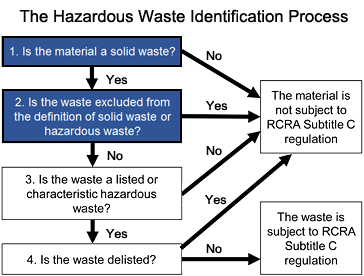The Single Strategy To Use For Reclaim Waste
The Single Strategy To Use For Reclaim Waste
Blog Article
The 9-Second Trick For Reclaim Waste
Table of ContentsNot known Details About Reclaim Waste The smart Trick of Reclaim Waste That Nobody is Talking About8 Simple Techniques For Reclaim WasteReclaim Waste - The FactsSome Known Facts About Reclaim Waste.
Through appropriate liquid waste management, business can lower energy-intensive therapy procedures and disposal costs. They likewise reach preserve sources and allocate them in other pertinent processes. There are various guidelines that shield public wellness and the environment. By complying with a system for handling liquid waste, business can stay clear of pricey penalties and penalties and prevent adverse publicity.(https://www.behance.net/leonaube)Accumulate representative samples from numerous points within the waste stream to make sure precision. Conduct regular screening to track any kind of adjustments in the composition. Preserve in-depth documents of characterization for future reference and conformity functions. Fluid waste, specifically dangerous ones, presents considerable threats during this step. Proper procedures lessen spills, leakages, and various other crashes that can harm the workers and the general public.

Disinfection (e.g., chlorination, ultraviolet light, ozonation) and nutrient elimination (e.g., denitrification and phosphorus eradication) are recommended under stringent policies. Countless firms breached a number of liquid waste disposal laws in current years.
The Basic Principles Of Reclaim Waste

are used by sectors that create large volumes of low-toxicity fluid waste. Superficial basins have liquid waste that is allowed to evaporate through all-natural processes. The residue left can be thrown away in garbage dumps. entails shedding fluid waste at heats and transforming it into gas and ash. This kind of disposal undergoes strict ecological policies as a result of potentially unsafe discharges.
The findings ought to be recorded, assessed, and saved not just for entry to regulatory authorities yet likewise for making improvements in the future. Use reputable tools, approaches, and software remedies to make certain precise and constant information collection. Stay updated on appropriate ecological guidelines and sector criteria. Share information with relevant stakeholders (e.g., employees, regulative federal government agencies, and close-by neighborhoods) to keep openness and accountability.
Understanding these can assist them efficiently manage their operations and lessen their ecological influence. Companies that can't invest in centers must consider teaming up with the public sector for better solutions.
About Reclaim Waste
By applying extensive monitoring systems that include treatment and reusing techniques, routine surveillance, risk analyses, and adherence to neighborhood and federal guidelines, commercial facilities can contribute to the defense of groundwater supplies, ensuring their schedule for future generations (liquid waste disposal). Let's dive right into the significance of reliable liquid waste administration in the industrial industry, focusing on its ramifications for securing groundwater sources
The air pollution of groundwater sources due to improper liquid waste administration in the industrial market has far-reaching consequences for human wellness, farming, and the setting as a whole. Some of the potential influences triggered by such air pollution include: Infected Alcohol consumption Water Products: As groundwater provides a substantial section of Our site our alcohol consumption water, air pollution from commercial tasks can bring about harmful chemicals and microorganisms entering our water supply, posing wellness threats for humans.
Decreased Agricultural Performance: Farming depends heavily on groundwater for irrigation; therefore, contaminated water can prevent crop yields, infect farming items, and affect food safety. Given the significance of preserving groundwater resources, it is vital for organizations to take a proactive position in managing their fluid waste sensibly and stopping contamination.
A Biased View of Reclaim Waste
Fluid waste can infect land and contaminate waters. Information about managing and saving fluid waste, responding to spills and minimizing fluid waste is offered in the complying with fact sheets and assistance:.
The role of waste management professionals in guarding this priceless source can not be overemphasized. Polluted water and infected effluent administration: Guaranteeing that harmful liquids are securely eliminated and treated before they can damage our water resources.
Hence, integrating sustainable fluid waste administration into financial planning boosts economic security and shields the setting, showing the value of this technique. In conclusion, embracing specialist liquid waste monitoring methods is vital for guaranteeing a sustainable future, protecting our atmosphere and safeguarding the wellness of future generations.
When it involves disposing of waste, adhering to correct procedures is critical for a plethora of reasons. Appropriate garbage disposal is not nearly cleanliness; it's regarding guaranteeing the well-being of our setting, health, and the reliable use sources. Comprehending the importance of reliable waste monitoring can assist us all contribute to a healthier, cleaner earth.
Little Known Questions About Reclaim Waste.
Efficient waste management assists maintain clean streets and public areas, minimizing the visual impact of trash and making certain that waste does not harm wildlife. When waste is not gotten rid of properly, it can lead to contamination, where unsafe materials can leach into the soil, water systems, and the air, developing lasting ecological problems.
Report this page